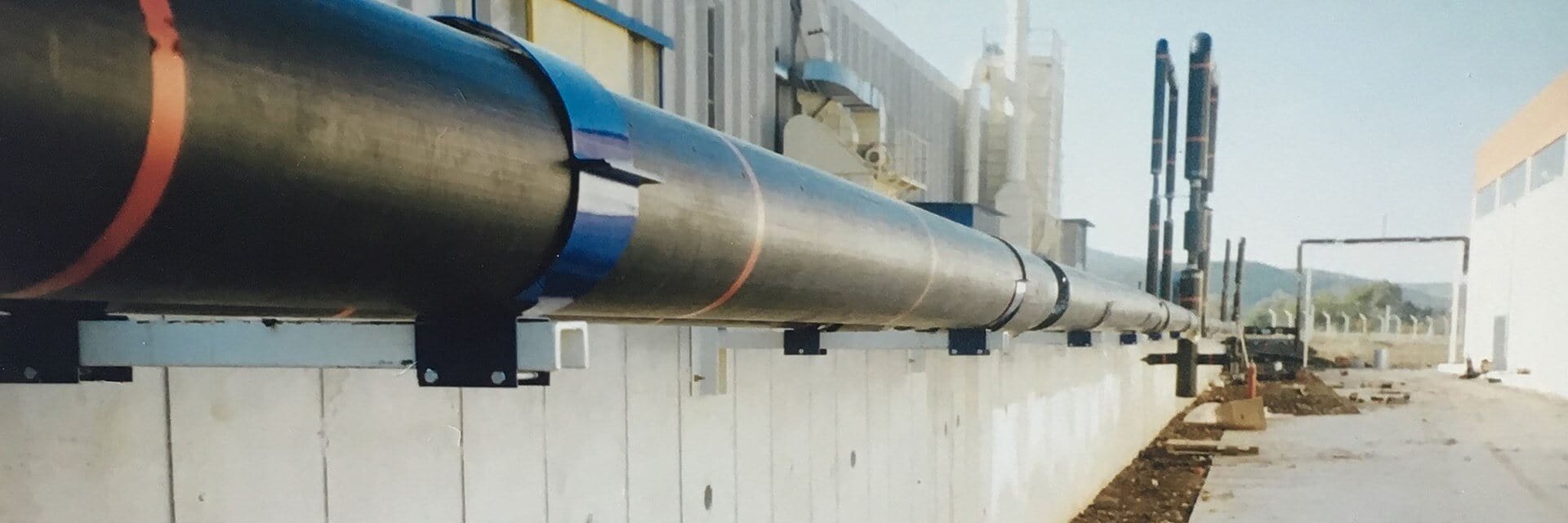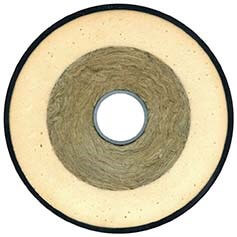
The manufacturing standards of seamless (rolled) steel pipes are as given below.
Technical Specifications
|
PRODUCTION STANDARD |
QUALITY OF STEEL |
|
EN 10216-2 |
P235GH-TC1 / P265GH-TC2 |
|
ASTM A106 |
GRADE A- GRADE B- GRADE C |
|
DIN 17175 |
St 35.8, St 45.8 |
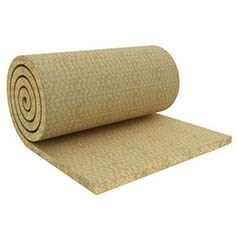
Rigid Polyurethane (PUR) provides insulation up to 140 °C. For the product that is planned to be used in higher temperature and pressure lines, an extra insulation material is needed. For this purpose, blanket type or prefabricated pipe type of rock wool is used. Rock wool, which is covered with aluminium foil after being wrapped on the carrier pipe, provides extra insulation. The rock wool used must meet the following minimum requirements in accordance with the standard TS EN 13501-1:
Technical Specifications
|
Rock Wool Type |
Blanket Type |
Prefabricated Pipe Type |
|
Density |
80-125 kg/m³ in accordance with the standard EN 1602 |
100 kg/m³ in accordance with the standard EN 1602 |
|
Thermal Conductivity |
λ≤0,040/mK in accordance with the standard EN 12667/12939 |
λ≤0,040/mK in accordance with the standard EN 12667/12939 |
|
Steam Diffusion Resistance Factor |
µ=1 in accordance with the standard EN 13162 |
µ=1 in accordance with the standard EN 13162 |
|
Operating Temperature |
-50 / +250ºC |
-50 / +250ºC |
|
Melting Point |
>1000°C in accordance with the standard DIN 4102 |
>1000°C in accordance with the standard DIN 4102 |
|
Thickness |
30-120 mm |
25-100 mm |
|
Aluminium Foil |
Coated |
Coated |
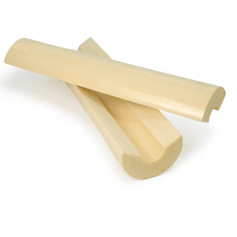
Rigid polyurethane foam is an insulation material with extremely low thermal transmission coefficient, consisting of mixing of polyol and isocyanate in certain ratios and pressure injection of these materials. PUR, which is injected between the carrier pipe and the casing pipe (HDPE), provides heat insulation as well as enabling two pipes operating as one pipe by bonding them together, and filling in the space between the pipes longitudinally. In the manufacturing of pre-insulated pipes, the PUR in accordance with the standard TS EN 253 has to meet the following minimum requirements:
Technical Specifications
|
Components |
Polyol and Isocyanate |
|
Minimum cellular mass density |
55 kg/m3 ISO 845 |
|
Max. Thermal Conductivity Coefficient |
0,029 W/mK ISO 8497 |
|
Average cell structure |
< 0,5 mm |
|
Closed cell content |
> %88 ISO 4590 |
|
Min. Radial Compressive Strength |
0,30 MPa ISO 844 |
|
Water absorption at high temperature |
<10% when tested according to TS EN 253 5.3.5 |
|
Axial cutting strength |
23 °C ± 2 °C ≥ 0,12 N/mm² |
|
140 °C ± 2 °C ≥ 0,08 N/mm² |
|
|
Temperature range |
-50 °C / +148 °C |
|
Impact strength |
No damage must exist - when tested in accordance with EN 253 5.4.5 |
|
Linear Water Tightness |
Must be Watertight When tested in accordance with EN 253 5.4.6 |
|
Chlorofluorocarbon |
None |
|
Service life of insulation according to continuous service temperature |
3 years at 140 ˚C |
|
30 years at 120 ˚C |
|
|
50 years at 115 ˚C |
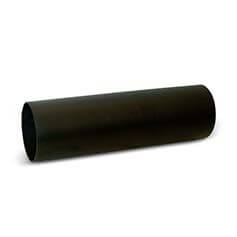
Extruded polyethylene casing pipe is used on the outermost part, which protects the insulation material from external factors and chemicals. The HDPE casing pipe manufactured in accordance with the standards TS EN 253 and TS EN 12201-2 must contain antioxidants, UV stabilisers and carbon black.
Technical Specifications
|
Standard |
EN 253, EN 12201-2 |
|
Dimensions |
EN 253 part 4.3.2.2 table 5 |
|
Material |
PE 80 – PE 100 ISO 9080 |
|
Density |
> 944 kg/m3 ISO 1133 |
|
Thermal Conductivity Coefficient |
0,43 W/mK |
|
Thermal Stability (OIT) |
> 20 min(210 °C) ISO 11357-6 |
|
Temperature Range |
40 °C / + 80 °C |
|
Cracking resistance under stress |
> 300 hrs(4 MPa, 80 °C) ISO 16770 |
|
Post-thermal treatment changes |
<3% (no damage must exist) ISO 2505 |
|
Melt Flow Index (MFI 190°C/5kg) |
0,2 < MFR ≤ 1,0 g/10dk ISO 1133 |
|
Carbon black content |
> by mass 2.5% ± 0.5 ISO 6964 |
|
Carbon black propagation degree |
<3 ISO 18553 |
|
Breaking elongation |
>% 350 ISO 6259-1 |
|
Hydrostatic Strength |
10,8 bar 80°C 165 sa ISO 1167-1-2 |
|
Inner surface treatment |
Corona process on extruded line (on-line) |
|
UV Protection |
Yes |
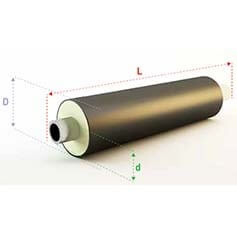
| PRODUCT NOMINAL SIZE | STEEL PIPE | HDPE CASING PIPE | ROCK WOOL**** | PUR | PIPE LENGTH | INSULATED PIPE WEIGHT(kg/m) | |||||
| DN | INCH | Outer Diameter dₐ (mm) | Wall Thickness t (mm) | Outer Diameter D (mm) | Wall Thickness s (mm) | Inner Diameter (mm) | Thickness (mm) | Thickness (mm) | L (mt) | ||
| Ø 15/110 | 15 | 1/2" | 21,3 | 2,00 | 110 | 3,0 | 104,0 | 35,00 | 6,35 | 6 | 1,97 |
| Ø 20/125 | 20 | 3/4" | 26,9 | 2,00 | 125 | 3,0 | 119,0 | 35,00 | 11,05 | 6 | 2,44 |
| Ø 25/125 | 25 | 1" | 33,7 | 2,30 | 125 | 3,0 | 119,0 | 35,00 | 7,65 | 6 | 2,97 |
| Ø 32/140 | 32 | 1 1/4" | 42,4 | 2,60 | 140 | 3,0 | 134,0 | 35,00 | 10,8 | 6 | 3,94 |
| Ø 40/140 | 40 | 1 1/2" | 48,3 | 2,60 | 140 | 3,0 | 134,0 | 35,00 | 7,85 | 6 | 4,29 |
| Ø 50/160 | 50 | 2" | 60,3 | 2,90 | 160 | 3,0 | 154,0 | 35,00 | 11,85 | 6 | 5,74 |
| Ø 65/180 | 65 | 2 1/2" | 76,1 | 2,90 | 180 | 3,0 | 174,0 | 35,00 | 13,95 | 6 | 7,15 |
| Ø 80/180 | 80 | 3" | 88,9 | 3,20 | 180 | 3,0 | 174,0 | 35,00 | 7,55 | 6 | 8,56 |
| Ø 100/225 | 100 | 4" | 114,3 | 3,60 | 225 | 3,4 | 218,2 | 35,00 | 16,95 | 6 | 12,69 |
| Ø 125/250 | 125 | 5" | 139,7 | 3,60 | 250 | 3,6 | 242,8 | 35,00 | 16,55 | 6-12 | 15,46 |
| Ø 150/280 | 150 | 6" | 168,3 | 4,00 | 280 | 3,9 | 272,2 | 35,00 | 16,95 | 6-12 | 20,30 |
| Ø 200/355 | 200 | 8" | 219,1 | 4,50 | 355 | 4,5 | 346,0 | 35,00 | 28,45 | 6-12 | 30,37 |
| Ø 250/450 | 250 | 10" | 273 | 5,00 | 450 | 5,2 | 439,6 | 35,00 | 48,3 | 6-12 | 43,86 |
| Ø 300/500 | 300 | 12" | 323,9 | 5,60 | 500 | 5,6 | 488,8 | 35,00 | 47,45 | 6-12 | 56,68 |
| Ø 350/560 | 350 | 14" | 355,6 | 5,60 | 560 | 6,0 | 548,0 | 35,00 | 61,2 | 6-12 | 64,68 |
| Ø 400/630 | 400 | 16" | 406,4 | 6,30 | 630 | 6,6 | 616,8 | 35,00 | 70,2 | 6-12 | 83,09 |
| Ø 450/710 | 450 | 18" | 457 | 6,30 | 710 | 7,2 | 695,6 | 35,00 | 84,3 | 6-12 | 96,77 |
| Ø 500/800 | 500 | 20" | 508 | 6,30 | 800 | 7,9 | 784,2 | 35,00 | 103,1 | 6-12 | 112,58 |
| Ø 600/900 | 600 | 24" | 610 | 7,10 | 900 | 8,7 | 882,6 | 35,00 | 101,3 | 6-12 | 146,99 |
| Ø 700/1000 | 700 | 28" | 711 | 8,00 | 1000 | 9,4 | 981,2 | 35,00 | 100,1 | 6-12 | 187,11 |
| Ø 800/1100 | 800 | 32" | 812,8 | 8,80 | 1100 | 10,2 | 1079,6 | 35,00 | 98,4 | 6-12 | 230,31 |
| Ø 900/1200 | 900 | 36" | 914 | 10,00 | 1200 | 11,0 | 1178,0 | 35,00 | 97 | 6-12 | 287,04 |
| Ø 1000/1400 | 1000 | 40" | 1016 | 10,50 | 1400 | 12,5 | 1375,0 | 35,00 | 144,5 | 6-12 | 353,82 |
| Ø 1200/1400 | 1200 | 48" | 1219 | 12,50 | 1400 | 12,5 | 1375,0 | 35,00 | 43 | 6-12 | 438,71 |
- Non-insulated pipe ends will have a length of 150 - 250 mm ±10 mm.
- Upon request, manufacturing can be made in lengths, diameters and insulation thicknesses different from the values in the table.
- Our company reserves the right to make changes on this and all other data in the brochures, written documentation and on our website. You may contact our company for getting up-to-date information.
- The thickness of rock wool is taken as 50 mm. Rock wool with a thickness of 50 mm will be approximately 35 - 40 mm thick when compressed and wrapped around the carrier pipe. Upon request, rock wool in various amounts of compression and thickness can be used.
Rockwool Reinforced Pre-Insulated Seamless Steel Pipes
Rockwool-reinforced pre-insulated seamless steel pipes offer cutting-edge solutions designed to meet the demanding thermal insulation and structural integrity requirements in various industries. These pipes combine the strength and durability of seamless steel with the excellent insulation properties of rockwool insulation, for long-term reliability. A seamless steel tube at its core ensures robustness against external pressures for increased reliability over time. Rockwool insulation layer delivers an outstanding thermal performance, effectively minimising heat loss or gain while decreasing energy consumption. Furthermore, this insulation material is fire-resistant and offers sound absorption properties - creating a safe and enjoyable atmosphere in which to live and work. Geothermal designs reduce time and costs during construction by eliminating the need for additional insulation installation. Rockwool reinforced pipes find application in heating, ventilation and plumbing industries that prioritize thermal insulation for efficient performance as well as structural strength. Their reliability provides reliable energy savings while improving system performance to meet stringent industry standards.
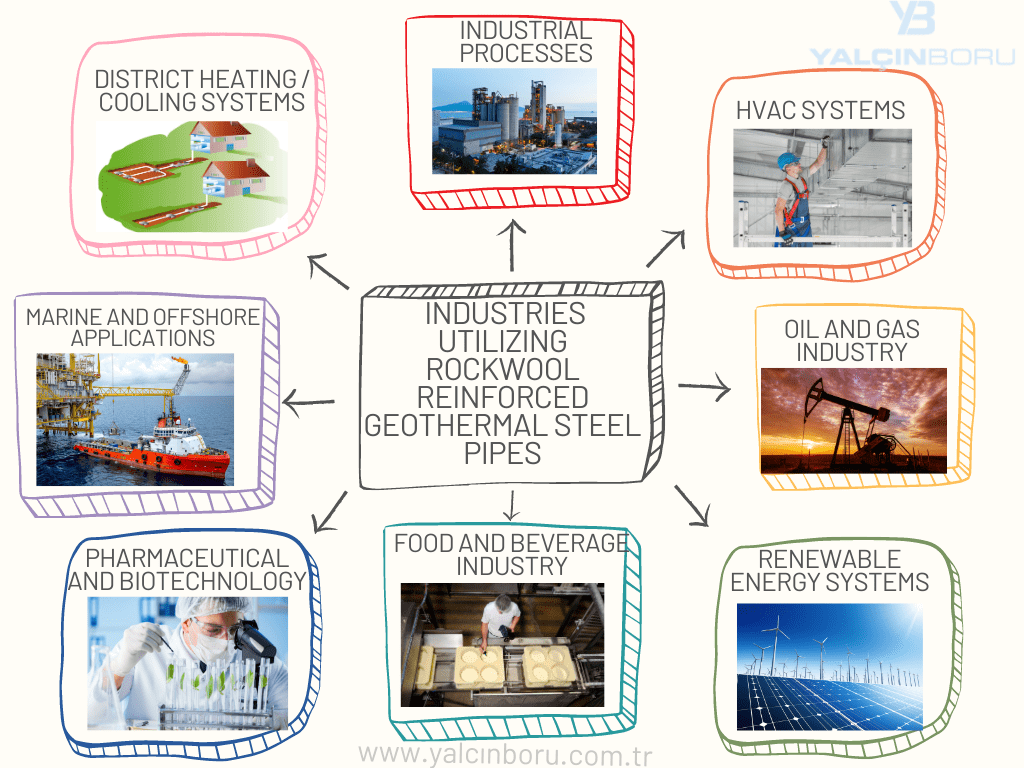
The Composition and Structure of Rockwool Reinforced Seamless Geothermal Steel Pipes
Rockwool reinforced seamless geothermal steel pipes are specially designed to offer optimum thermal insulation and structural strength and have multiple layers serving a specific function. At the core of each pipe is a seamless steel tube that offers excellent mechanical strength and resistance to external pressures, and rockwool insulation around the perimeter that acts as an effective thermal barrier. Made from natural stone fibres, rockwool insulation has superior heat and sound insulation properties, making it an ideal material for insulating pipes. The outer layer typically consists of a protective sheath of high-density polyethylene (HDPE). This provides protection against environmental elements, as well as the advantages of strength and durability to ensure its long-term viability. This multilayer geothermal pipe ensures that it remains well insulated, structurally sound and able to withstand various operating conditions, thus making it suitable for applications in industries such as heating, ventilation and plumbing.
Advantages and Benefits of Using Rockwool Reinforced Pre-Insulated Seamless Steel Pipes
- Excellent thermal insulation properties, reducing heat loss or gain
- Energy efficiency, leading to cost savings in heating and cooling systems
- Sound absorption properties, creating a quieter environment
- High strength and durability, withstanding high pressures and harsh conditions
- Seamless steel construction, minimizing the risk of leaks or failures
- Geothermal design, saving time and labor during installation
- Fire-resistant properties, enhancing safety in the event of a fire
- Corrosion resistance, extending the lifespan of the pipes
- Reduced maintenance and repair needs, minimizing downtime and costs
- Environmentally friendly, contributing to sustainable building practices
Applications and Industries Utilizing Rockwool Reinforced Seamless Geothermal Steel Pipes
District heating and cooling systems: Rockwool-reinforced seamless Geothermal steel pipes are commonly used in district heating and cooling systems to efficiently transport hot or cold water from central energy sources to residential, commercial, and industrial buildings.
Industrial processes: These pipes find application in various industrial processes where thermal insulation and efficient fluid transportation are critical, such as chemical plants, power generation facilities, and manufacturing industries.
HVAC systems: Rockwool-reinforced seamless steel pipes are utilized in heating, ventilation, and air conditioning (HVAC) systems to ensure efficient and reliable distribution of heated or chilled fluids throughout buildings.
Oil and gas industry: These pipes are employed in the oil and gas sector to transport various fluids, including crude oil, natural gas, and refined petroleum products, due to their durability, corrosion resistance, and thermal insulation properties.
Renewable energy systems: Rockwool-reinforced seamless geothermal steel pipes play a vital role in renewable energy systems like geothermal heating and solar thermal installations, enabling the efficient transfer of heat or energy from the source to the desired application.
Cold storage and refrigeration: These pipes are used in cold storage facilities, refrigeration units, and freezer rooms to maintain consistent temperatures and minimize energy loss, ensuring the preservation of perishable goods.
Food and beverage industry: Rockwool-reinforced pre-insulated seamless steel pipes are employed in food and beverage processing plants to transport hot water, steam, and chilled fluids, ensuring precise temperature control and maintaining the quality of products.
Pharmaceutical and biotechnology sector: These pipes are utilized in pharmaceutical and biotechnology industries to transport critical fluids, such as purified water, WFI (water for injection), and process liquids while maintaining strict adherence to quality and cleanliness standards.
Marine and offshore applications: Rockwool-reinforced steel pipes are used in marines and offshore environments, such as offshore oil rigs and ships, for the efficient transfer of fluids, withstanding the corrosive effects of saltwater and extreme weather conditions.
Building construction and infrastructure: These pipes are incorporated into construction and infrastructure projects, including residential, commercial, and institutional buildings, providing reliable and efficient fluid transportation for heating, cooling, and plumbing systems.
Installation and Assembly Techniques for Rockwool Reinforced Pre-Insulated Seamless Steel Pipes
Installation and assembly techniques for Rockwool-reinforced seamless geothermal steel pipes involve several key steps to ensure proper functionality and long-term performance. Firstly, the pipes need to be accurately measured and cut to the desired lengths. Next, the ends of the pipes are prepared by removing any burrs or rough edges. The joining method can vary based on the specific project requirements but typically involves welding, flange connections, or mechanical couplings.
Care must be taken to ensure proper alignment and a secure connection to prevent leakage. During installation, support brackets or hangers are used to provide structural support and maintain the desired positioning of the pipes. Additionally, proper insulation and sealing of joints and connections are essential to maintain thermal efficiency. Special attention should be given to areas where the pipes pass through walls or floors to ensure proper insulation and avoid potential heat loss or gain.
Finally, after installation, the system should be thoroughly inspected and tested to ensure its integrity and functionality. Following industry best practices and adhering to manufacturer guidelines is crucial to achieving a successful installation of rockwool reinforced pre-insulated seamless steel pipes.
Thermal Insulation Properties of Rockwool Reinforced Seamless Geothermal Steel Pipes
Rockwool-reinforced seamless geothermal steel pipes possess exceptional thermal insulation properties, making them an ideal choice for applications where heat transfer control is crucial. The rockwool insulation layer within the pipes acts as a highly efficient barrier, effectively minimizing heat loss or gain. This insulation material is known for its high thermal resistance, low thermal conductivity, and excellent fire-resistant properties. By reducing heat transfer, these pipes help maintain desired temperatures within the fluid being transported, resulting in energy savings and improved system efficiency.
The Rockwool insulation also contributes to the prevention of condensation, as it limits the temperature differential between the fluid and the surrounding environment. This reduces the risk of corrosion and damage to the piping system. Whether it's in district heating networks, industrial processes, or HVAC systems, the thermal insulation properties of Rockwool-reinforced seamless steel pipes play a critical role in optimizing energy efficiency and ensuring reliable thermal performance.
Durability and Longevity of Rockwool Reinforced Pre-Insulated Seamless Steel Pipes
Rockwool reinforced pre-insulated seamless steel pipes are renowned for their exceptional durability and longevity. The seamless steel construction of these pipes provides inherent strength and resistance to external pressures, ensuring their ability to withstand harsh operating conditions.
The steel material is corrosion-resistant, minimizing the risk of degradation over time and extending the lifespan of the pipes. Additionally, the Rockwool insulation layer offers protection to the steel surface, acting as a barrier against moisture and external elements. This insulation also enhances the overall structural integrity of the pipes. With proper installation and maintenance, rockwool-reinforced seamless steel pipes can serve for decades without significant degradation or performance issues.
This durability not only ensures long-term reliability but also reduces the need for frequent replacements or repairs, resulting in cost savings and reduced downtime. Industries and applications that demand robust and long-lasting piping solutions can rely on the durability and longevity of rockwool-reinforced pre-insulated seamless steel pipes.
Environmental Considerations and Sustainability of Rockwool Reinforced Seamless Geothermal Steel Pipes
Rockwool reinforced pre-insulated seamless steel pipes feature environmentally responsible features that contribute to sustainable practices. First off, their rockwool insulation is produced from natural stone fibers which reduce non-renewable resources use.
Rockwool insulation materials derived from fossil fuels may not be eco-friendly alternatives; Rockwool is widely known for being eco-friendly as it reduces waste generation through longer pipe lifespan and fewer replacement needs, thus decreasing waste generation. Rockwool insulation's thermal efficiency leads to energy savings, leading to decreased greenhouse gas emissions and carbon footprint.
Furthermore, its seamless steel construction ensures long-term sustainability and enhances sustainability even further. Effectively designed and installed rockwool-reinforced steel pipes contribute to energy-efficient systems, the conservation of resources, and an overall greener built environment. Their use falls in line with sustainable building practices that promote a more environmentally responsible future.
Maintenance and Repair Guidelines for Rockwool Reinforced Pre-Insulated Seamless Steel Pipes
Maintaining rockwool-reinforced pipes requires following maintenance and repair guidelines in order to maximize their performance and lifespan. Regular inspection is advised to identify signs of damage such as leakage, corrosion or insulation degradation as soon as they emerge. Resolve issues quickly in order to avert further degradation.
When conducting maintenance or repairs, be sure to abide by manufacturer guidelines and industry best practices. If insulation needs to be repaired or replaced, make sure the new material fits into place seamlessly and meets both thermal and fire-retardant specifications. When replacing or repairing damaged sections of piping, take special care in sealing joints and connections to preserve thermal efficiency and avoid leaks.
If welding is required, employ skilled personnel with expertise in specific welding techniques for the pipe material. Consider also creating a preventive maintenance program, including routine cleaning, insulation inspections and performance reviews of Rockwool-reinforced pre-insulated seamless steel pipes over their operational lifetime. Following such guidelines will help ensure the continued reliability and efficiency of your system.
Case Studies and Success Stories of Rockwool Reinforced Seamless Geothermal Steel Pipes in Real-World Applications
Rockwool-reinforced seamless geothermal steel pipes have proven their value and effectiveness in various real-world applications as evidenced by various case studies and success stories. District heating systems utilize pipes as part of their distribution infrastructure to efficiently distribute heat with minimum loss. They have become an integral component in many projects around the globe and ensure maximum heat distribution efficiency with minimum losses.
District heating projects in large urban areas often realize significant energy savings and reduced carbon emissions by employing rockwool-reinforced steel pipes that have Rockwool insulation for greater energy savings and decreased emissions. Chemical plants and refineries rely heavily on plastic pipes as reliable means for fluid transportation, with this type of pipe providing outstanding durability and resistance to corrosive substances ensuring efficient fluid transport.
Rockwool-reinforced seamless steel pipes have become indispensable components of geothermal heating installations, helping ensure maximum heat transfer efficiency from source to end-users. These success stories demonstrate the durability, efficiency, and long-term performance of rockwool-reinforced pre-insulated seamless steel pipes as an efficient thermal insulating and fluid transportation solution.
Potential Developments in Rockwool Technology in Piping Systems
Nanotechnology Integration: Exploration of nanotechnology to enhance the performance of ROCKWOOL insulation in pipe systems, offering improved thermal resistance, moisture resistance, and durability.
Self-healing Properties: Research into self-healing capabilities of ROCKWOOL materials, allowing for automatic sealing of minor cracks or damage in pipe insulation, reducing the risk of energy loss and potential leaks.
Energy Storage Integration: Investigation of energy storage solutions within ROCKWOOL pipe systems, enabling the capture and storage of excess heat or cold for later use, optimizing energy efficiency and reducing reliance on external energy sources.
Intelligent Heat Distribution: Advancements in ROCKWOOL technology to enable intelligent heat distribution within pipe systems, directing heat flow based on demand, optimizing energy usage, and reducing operational costs.
Antimicrobial Properties: Development of ROCKWOOL materials with inherent antimicrobial properties to inhibit the growth of bacteria or mold in pipe systems, ensuring hygienic conditions and reducing the risk of contamination.
Robust Insulation for Extreme Environments: Innovation in ROCKWOOL technology to create insulation solutions that can withstand extreme temperatures, corrosive environments, or high-pressure conditions, expanding the range of applications in challenging industries.
Automation and Prefabrication: Implementation of automation and prefabrication techniques in the production of ROCKWOOL pipe systems, improving manufacturing efficiency, reducing human error, and enabling faster project completion.
Life Cycle Analysis and Environmental Certification: Focus on conducting life cycle assessments of ROCKWOOL pipe systems to evaluate their environmental impact at different stages, and obtaining environmental certifications to showcase their sustainability credentials, promoting wider adoption in environmentally conscious industries.
Contents
Rockwool Reinforced Pre-Insulated Seamless Steel Pipes
The Composition and Structure of Rockwool Reinforced Seamless Geothermal Steel Pipes
Advantages and Benefits of Using Rockwool Reinforced Pre-Insulated Seamless Steel Pipes
Applications and Industries Utilizing Rockwool Reinforced Seamless Geothermal Steel Pipes
Installation and Assembly Techniques for Rockwool Reinforced Pre-Insulated Seamless Steel Pipes
Thermal Insulation Properties of Rockwool Reinforced Seamless Geothermal Steel Pipes
Durability and Longevity of Rockwool Reinforced Pre-Insulated Seamless Steel Pipes
Maintenance and Repair Guidelines for Rockwool Reinforced Pre-Insulated Seamless Steel Pipes
Potential Developments in Rockwool Technology in Piping Systems

